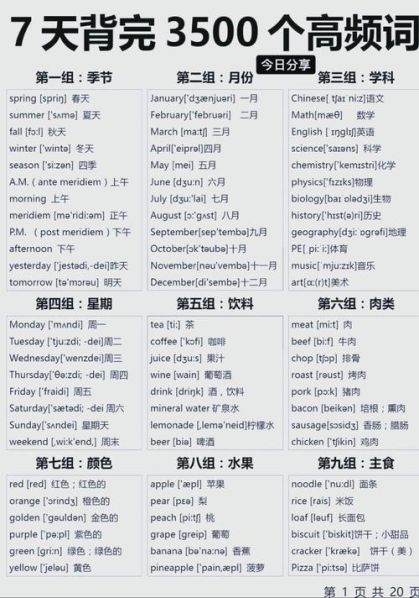: Mastering 3500 New Words: A Quick-Learning Methodology and Techniques
Introduction: Mastering a comprehensive vocabulary of 3500 words is an ambitious yet attainable goal for English learners. It not only boosts your communication and understanding of the language but opens up vast opportunities for academic and professional success. However, achieving this lexical milestone requires both strategic thinking and consistent effort. In this article, we delve into quick-learning methods and techniques that can significantly accelerate the process of mastering a significant amount of new English words.
-
Understand the Importance of Vocabulary Acquisition Vocabulary acquisition is the foundation stone of effective communication in any language. It allows you to convey meanings accurately and effectively, which is crucial for building a robust understanding of the target language. By having a substantial vocabulary base, learners are able to comprehend complex texts, express themselves creatively, and navigate the world of information with ease. Hence, it is paramount to invest time and energy in acquiring a large pool of new English words.
-
Organize Your Learning Strategies A well-structured plan can significantly improve learning outcomes. Here's a recommended learning strategy:
a) Set Realistic Goals: Decide on a realistic vocabulary goal—for example, aiming to learn a certain number of words each day—and break it down into manageable segments. This approach keeps you motivated, focused, and avoids feeling overwhelmed.
b) Create Memories by Repeated Use: Repetition strengthens memory recall. Creating memorized phrases or short stories from the new words will help solidify their associations in your mind.

c) Use Multimedia Tools: Technology plays a pivotal role in learning vocabulary effectively. Audio books, podcasts, and apps like Anki and Memrise provide engaging content to reinforce what you have learned.
d) Practice Actively in Conversation and Writing: Immerse yourself in conversations with native speakers or peers to practice your newly acquired words. Write down sentences using these new terms and review them frequently.
e) Regular Review with Flashcards and Scraping Techniques: Regular revision helps retain the learned material. Using flashcards can be an effective way to revisit and refresh your memory with new words.
f) Analyze the Vocabulary in Textbooks and Literature: Analyzing the contextual use of words in textbooks or literature exposes you to new words and their usage patterns, which aids in comprehension and application.
g) Seek Feedback: Ask someone you trust to correct you if you've made mistakes in your attempts to remember words. Constructive feedback encourages further learning and helps to identify areas of improvement.
Apply Visual Learning Techniques Visual aids make learning more engaging and memorable. Here are some techniques to enhance visual memory for words:
a) Draw Images: For many words that don’t immediately translate to visuals, drawing pictures can spark interest and aid memory retention.
b) Make Flashcards: Flashcards can be created with words, definitions, synonyms, and examples. They can be easily organized and reviewed.
c) Create Animations: If you enjoy visualizing, animations could serve as fun and effective tools for visualizing vocabulary elements, such as word roots or prefixes.
d) Use Mind Maps: Mind maps can help organize related words into categories based on their meanings or functions, creating a cohesive structure in your mind.
-
Engage with Other Learners Collaboration in learning can create a positive environment where ideas, strategies, and motivations come together. Participating in group learning activities or finding study partners can offer different learning styles and perspectives that may lead to better retention of new vocabulary.
-
Stay Healthy and Productive Maintaining good physical and mental health while learning can enhance your productivity and overall effectiveness. Ensure adequate sleep, exercise regularly, eat a balanced diet, and take breaks to recharge.
-
Embrace Variety and Keep Learning Fresh Variety is key when it comes to language learning. Trying new vocabulary through varied mediums, contexts, and experiences keeps learning interesting and prevents monotony.
-
Use Natural Language Processing Apps Natural language processing (NLP) apps can help with grammar, sentence structure, syntax, and pronunciation, providing a deeper understanding of the language and enhancing your ability to communicate effectively. These programs often include interactive exercises designed to reinforce learning.
Conclusion: Accumulating a lexicon of over 3500 new words requires dedication, consistency, and a blend of various learning strategies. By adopting a well-structured plan, actively incorporating visual, auditory, and kinesthetic learning, and engaging in collaborative learning environments, one can significantly speed up the pace of vocabulary acquisition and achieve the goal of becoming proficient in English in a reasonable amount of time.
本文来自作者[汪语蓉]投稿,不代表臻货网立场,如若转载,请注明出处:https://www.zhenhuowang.com/jyhz/202505-2853.html


评论列表(4条)
我是臻货网的签约作者“汪语蓉”!
希望本篇文章《英语快速记单词的方法和技巧 速记单词3500个顺口溜》能对你有所帮助!
本站[臻货网]内容主要涵盖:百科大全、知识汇总、百科经验、常识大全、科普解惑、经验汇总等
本文概览:: Mastering 3500 New Words: A Quick-Learning Methodology and TechniquesIntroduction:Mast...